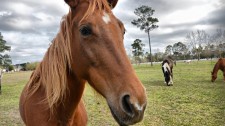Christina Inserillo Explains How Equine Diets Affect the Immune System in Horses

Boulder, Colorado, July 21, 2017 (Newswire.com) - The role of diet in general health is fairly obvious; you eat well, you exercise enough, and hopefully your body has the fuel it needs to help protect you into a long life.
Christina Inserillo says, "The same basic principle, unsurprisingly, applies to animals. Horses, in particular, are known for their susceptibility to certain illnesses; things like tetanus, sleeping sickness, influenza, rhino-pneumonitis, West Nile Virus, rabies, strangles, and arthritis are unfortunately not as uncommon as we would like."
However, it is thought that by supplementing the diet of healthy horses with the appropriate foods they need to source the nutrients required for a functioning immune system, you can help protect them in the long-term.
One student currently working towards her graduate degree in animal health has been looking into the subject as part of her studies. Now an expert in the area, Christina Inserillo has been riding horses for years and competed in many competitions. Her childhood love for the animals has led her on to her current path, where she hopes to make a significant positive impact in helping horses around the globe stay healthy.
While it’s less clear whether horses suffering from illness can make a recovery thanks to a good diet, science over the last three decades has allowed equine nutritionists to expand on their knowledge of how horses digest food and use it to stay healthy.
At the 15th Annual Mid-Atlantic Nutrition Conference in Hunt Valley, Maryland in April this year, one nutritionist presented on the topic. Lori Warren, PHd, PAS, who is an Equine Nutritionist at the Department of Animal Sciences at the University of Florida, spoke at length about how food affects horses.
“The processes of digestion and immunity are interwoven,” said Warren. “Over 70% of immunity is associated with the digestive system.”
To simplify, she explained how the immune system works on a fundamental level. First, it has two main components: one is the innate immune system, and the other is the adaptive immune system.
The innate system provides the first line of defense in fighting pathogens (organisms which cause disease) and is kind of an “umbrella” or “catch-all” system; more of a jack-of-all-trades than a specialist. All of us are born with this innate system, and it continues to work – more or less – the same way for as long as we exist.
The adaptive system, on the other hand, is trained by its own experiences. It starts to store and recall information on pathogens it interacts with so that it can fight them faster the next time they’re encountered.
While it does do a lot of work on its own, it is possible to boost the adaptive system by using what we know as vaccinations. These can be a quick way to boost the immune system, but – of course – can only be used to protect against certain illnesses.
In this way, the innate and adaptive systems coordinate an effort to help protect a horse’s health.
In recent years, though, it has become particularly common for horse owners to purchase nutritional supplements in the hope that they’ll boost the immune systems of their pets. Whether or not these supplements are genuinely as effective as it would seem, it’s still unclear.
Warren herself has said that more research needs to be done on foods which treat digestive health, specifically on probiotics in horses.
The ambiguity in the topic stems from the fact that researchers are not yet able to properly analyze the immune system of horses to determine what effects the food they eat have. One possible solution to this is for them to compromise the health – or challenge the needs of – the immune system of healthy horses.
An alternative proposal is to test particularly nutritional foods and nutritional supplements on horses which may already have compromised health (which is often a consequence of stress caused during transport, weaning stress, or exposure to inflammatory agents).
However, as basic as their current understanding may be, it has been established that there are several nutrients which will – to some extent - benefit the health of equine animals. This list is relatively broad, and includes things like fat, protein, vitamins, and minerals.
Researchers have also documented the results of fat and fiber in the immune systems of horses, and Omega-3 fatty acids have already exhibited positive effects, most notably when it comes to their anti-inflammatory properties with respect to osteoarthritis and inflammatory airway disease.
Similarly, functional fibers (found in probiotic-rich foods such as beet pulp and oat hulls) can help to battle pathogenic bacteria in the gut by assisting bacteria to produce significant volumes of volatile fatty acids.
As the field is still in its infancy, it’s hard to determine exactly how foods that horses eat can fortify their immune systems and help them to stay healthy. However, it would make sense that a diet which is broad in food groups, balanced, and rich in nutrients has a better chance of keeping horses healthy; the science, though, is yet to fully corroborate this.
Source: Christina Inserillo